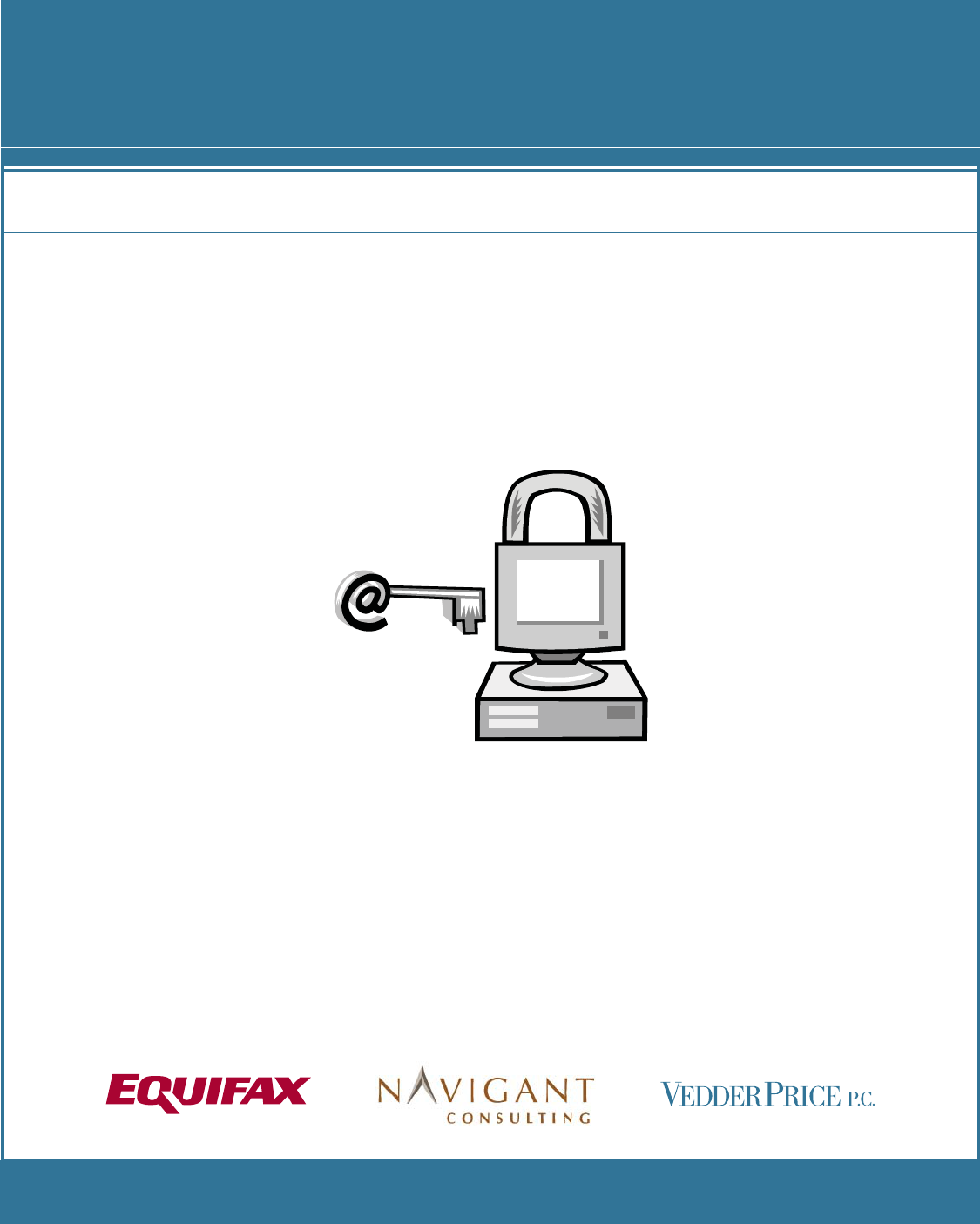
Special Report
The HITECH Act
Privacy and Data Breach Notification Provision
August 2009
On February 17, 2009, President Obama signed into law
the $787 billion stimulus package known as the American
Recovery and Reinvestment Act (ARRA). Contained within
ARRA is the Health Information Technology for Economic
and Clinical Health Act (HITECH Act), which includes a
multi-billion-dollar stimulus for the adoption of electronic
health records. In addition, the HITECH Act imposes on
entities a number of legal obligations designed to supplement
and broaden HIPAA privacy and security
requirements as well as various state
privacy breach notification rules.
The purpose of this article is
threefold. First, it provides an overview
of the HITECH Act and highlights some
of the key new obligations imposed by
the Act. Second, the article addresses
where the HITECH Act fits in the
universe of breach notification laws.
Finally, the article outlines, beyond
obligations arising from the HITECH
Act, general steps entities should take to reduce the likelihood
of, prepare for and respond to a privacy breach.
The Extension of HIPAA Obligations
to Business Associates
The HITECH Act contains provisions designed to safeguard
“protected health information” (PHI) above and beyond
current HIPAA requirements. One of the primary ways in
which the HITECH Act accomplishes this is by extending
An Overview of the HITECH Act
HIPAA security and privacy obligations to cover “business
associates” of entities that are presently covered by HIPAA
(e.g., healthcare providers who transmit health information
electronically, health plans and healthcare clearinghouses).
The term “business associate” is fully defined in the
regulations promulgated under HIPAA, but generally
includes entities that access, maintain, retain, modify,
record, store, destroy or otherwise
hold, use or disclose unsecured PHI.
Such entities may include, but are not
limited to, companies that provide
claims administration, data analysis,
processing or administration, utilization
review, quality assurance, billing, benefit
management, legal support, accounting,
financial services and IT consulting.
In the past, these entities may
have had contractual obligations to
notify HIPAA-covered entities of PHI
disclosure and security incidents. Now,
business associates face civil and even criminal penalties for
HIPAA violations under the HITECH Act.
HITECH Act Notifi cation Requirements
The HITECH Act also imposes on HIPAA-covered entities,
business associates and certain other entities (described
below) notification requirements in the event of a privacy
breach. The Act defines a breach as the “unauthorized

– 2 –
Special Report August 2009
acquisition, access, use or disclosure of protected health
information which compromises the security or privacy
of such information, except where an unauthorized
person to whom such information is disclosed would not
reasonably have been able to retain such information.”
In such a situation, the entity is required to provide
notification within a given amount of time (“without
unreasonable delay and in no case later than 60 calendar
days after the discovery of a
breach”) and via particular
methods (written, telephonic,
Web site or media notification
depending on the number
of affected individuals, the
possibility of imminent
misuse of the disclosed PHI
and whether the entity has
current contact information
for those individuals). In certain large breach situations,
the entity is also required to provide immediate notice to
the Secretary of Health and Human Services, and annual
notice for all other breaches.
Regardless of the method of breach notification,
notice of the breach is to include:
A brief description of what happened,
including the date of the discovery of the
breach, if known.
A description of the types of unsecured
protected health information that were
involved in the breach (such as full name,
Social Security number, date of birth, home
address, account number and disability
code).
The steps individuals should take to protect
themselves from potential harm resulting
from the breach.
A brief description of what the covered entity
involved is doing to investigate the breach,
to mitigate losses and to protect against any
further breaches.
Contact procedures for individuals to ask
questions or learn additional information,
which shall include a toll-free telephone
number, an e-mail address, Web site or
postal address.
1)
2)
3)
4)
5)
These breach notification requirements will also
apply to entities that are neither covered entities nor
business associates, with respect to breaches of security
of “personal health records.” A personal health record
(PHR) is an electronic record containing individually
identifiable information received from or on behalf
of the individual who is the subject of the record
“that can be drawn from multiple sources and that is
managed, shared, and controlled by or primary for the
individual.” Noncovered entities
and nonbusiness associates who
(i) offer products or services
through the Web site of a vendor
of PHR, (ii) offer products or
services through the Web site of
covered entities that make PHR
available to individuals and/or
(iii) access information in a PHR
or send information to a PHR are required to notify an
individual of the security breach in the same manner as
described above and, additionally, to notify the Federal
Trade Commission.
Examples of such entities include companies with
Web-based applications that help consumers manage
medications, a bricks-and-mortar company advertising
dietary supplements online, companies that provide
online medication or weight tracking programs and
companies that provide online applications through
which individuals can connect blood pressure cuffs,
blood glucose monitors or other devices so that the
results can be tracked through their personal health
records. Entities that provide services to PHR vendors
are required, upon discovery of a security breach, to
provide notice to the PHR vendor, and the PHR vendor
is required to notify the individual.
Technology and Methodology Guidance
The notification procedures outlined in the HITECH Act
are triggered when there is a disclosure of “unsecured”
PHI. The Act directed the Department of Health
and Human Services to issue guidance specifying
technologies and methodologies entities can use to
render PHI unusable, unreadable or indecipherable to
unauthorized individuals. The Department of Health
and Human Services issued such guidance on April 17,
The notification procedures
outlined in the HITECH Act
are triggered when there is a
disclosure of ‘unsecured’ PHI

– 3 –
August 2009 The HITECH Act
2009, and noted therein that “while covered entities
and business associates are not required to follow the
guidance, the specified technologies and methodologies,
if used, create the functional equivalent of a safe harbor,
and thus, result in covered entities and business
associates not being required to provide the notification
otherwise required by [the HITECH Act] in the event of
a breach.” Covered entities and business associates thus
have added motivation to adopt the technologies and
methodologies advanced by the Department of Health
and Human Services.
The Interaction between the HITECH Act
and Preexisting Breach Obligations
Although it imposes legal obligations on covered entities
and business associates, the HITECH Act, in conjunction
with the guidance provided by the Department of
Health and Human Services, is beneficial to entities
in that it lays out a protocol to follow in the event of a
breach involving PHI. Unfortunately, however, entities’
response obligations are not limited to adherence to the
HITECH Act.
Most states (44 at the time of publication of this
paper) have enacted legislation that sets forth notification
requirements in the event of
breach involving personal
identification information.
A few states also have
notification laws that
apply specifically to health
data. These notification
requirements may differ
from those provided for in
the HITECH Act, and state
notification requirements often differ from one another.
This means that, when impacted individuals are located
in multiple states, the entity providing notice often finds
itself having to proceed under multiple state notification
statutes.
In addition to the HITECH Act and various state
notification laws, entities must also comply with the
HIPAA Privacy Rule, which requires covered entities
to mitigate the harmful effects of a breach, as well as
common law obligations to take reasonable steps to
protect personal information pre- and post-breach.
Failure to abide by these obligations can result in civil
litigation and/or action by the FTC or other government
and law enforcement agencies.
As the Department of Health and Human Services
notes:
[W]hile adherence to this guidance may result
in covered entities and business associates
not being required to provide notifications
in the event of a breach, covered entities and
business associates still
must comply with all
other federal and state
regulatory obligations
that may apply
following a breach
of PHI, such as state
breach notification
requirements, if
applicable, as well
as the obligation on
covered entities at 45 CFR 164.530(f) of the
HIPAA Privacy Rule to mitigate, to the extent
possible, any harmful effect that is known to the
covered entity as a result of the breach of PHI
by the covered entity or business associate.
In short, the obligations of covered entities and
business associates to safeguard PHI and other personal
identification information does not begin and end with
the HITECH Act, and entities should remain cognizant
of the existence of other legal obligations.
Failure to abide by these
obligations can result in civil
litigation and/or action by the
FTC or other government and law
enforcement agencies

– 4 –
Special Report August 2009
Privacy Breach Reduction; Preparation and Response
Protecting confidential and proprietary information is
absolutely necessary, not only to satisfy the HITECH Act
and other existing legal obligations, but to maintain sound
customer relationships and public goodwill. No entity
wants to find itself obligated to disclose to its customers,
government agencies or especially major media outlets
that the personal health information of its customers or
others has been disclosed and compromised.
As information becomes increasingly decentralized
with the advancement of technology, preventing data
breaches is becoming more and more difficult. Since
January 2005, the Privacy Rights Clearinghouse has
recorded well over 1,000 data breaches involving more
than 250 million records. These breaches have occurred
in every field, including the healthcare industry. Perhaps
more concerning is a recent report by the Identity Theft
Resource Center of San Diego that suggests the problem
is getting worse. The Center found that, in 2008,
businesses, governments and educational institutions
reported nearly 50 percent more
data breaches than in 2007. It
is thus imperative that steps be
taken before a breach occurs to
manage information in a secure
fashion, and to be prepared to
appropriately and quickly respond
in the event of a data breach.
HITECH Act Compliance and
Data Protection
The first step in safeguarding PHI
and other personal information is to make sure policies
and security procedures are in place to reduce the
likelihood of a data breach. Due to preexisting HIPAA
requirements, most in the healthcare industry should
already have in place such policies and procedures.
However, in light of the HITECH Act, covered entities
and business associates should do the following:
Update data security to meet the
guidelines and methodologies provided
)
by the Department of Health and Human
Services.
Audit existing data security technology, as
well as identity theft and record management
policies and programs, for potential security
and compliance gaps.
Update contracts with business associates to
address HITECH Act requirements.
Preparing for a Data Breach
As detailed above, entities that have suffered a data
privacy breach have obligations under the HITECH Act,
state statutes and common law to react promptly and
properly. This is often easier said than done.
Breach investigation and containment is often
complex, particularly in the case of hacking or other
data theft situations. Once it is determined how the
breach occurred, entities must still make determinations
such as who was affected, how
many individuals were affected,
where those individuals reside
and whether there exists current
contact information for those
individuals. Entities must
determine their notification
obligations, based, not only on
the HITECH Act, but on varied
state laws as well, and then
carry out those obligations.
Contact procedures should
be created for those affected
individuals who have questions, and, if the breach could
lead to possible identity theft, the entity will want to
arrange for credit monitoring to prevent further harm
from the breach.
Each of the tasks in this incomplete list of post-
breach activities and obligations requires time and effort.
Thus, to the extent that an entity can prepare in advance
for a data breach, it should do so. This includes:
)
)
Breach investigation
and containment is often
complex, particularly
in the case of hacking
or other data theft
situations

– 5 –
August 2009 The HITECH Act
Implementing and/or updating security
breach response plans.
Contracting in advance for credit monitoring
and other breach-related services to avoid
having to negotiate rates from a position of
weakness (namely, post-breach).
Incident Management and Response
While implementing technology and security procedures
can lessen the likelihood of a breach, breaches may still
occur. If a breach does occur, entities should immediately
conduct a preliminary investigation as to how the breach
occurred, and take the necessary steps to ensure that the
breach is contained and corrective action is employed. If
the situation involves potential employee or third-party
misconduct, a legal investigation and possibly a “cyber”
investigation may be required. If business associates or
other third parties are involved in the security breach,
steps must be taken to ensure that the third party is
taking proper steps to contain the breach and retrieve
or destroy disclosed information, and that third-party
going-forward obligations are quickly agreed upon.
Once the breach has been contained (or even in
conjunction with the containment process), the company
must assess the risks associated with the breach. This
includes, among other things, determining:
The type of information involved in the
breach.
Who was affected by the breach (employees,
customers, patients, etc.).
The number of individuals affected by the
breach.
The location of individuals affected by the
breach.
)
)
)
)
)
)
Whether current contact information exists
for the individuals affected by the breach.
The foreseeable harm to the affected
individuals given the nature of the breach.
This last determination requires an examination of
issues such as:
Whether the information disclosed was
protected by means such as passwords or
encryption.
Whether this means satisfies the security
guidelines issued by the Department of
Health and Human Services in response to
the HITECH Act.
The nature of the personal information
disclosed (PHI, credit card numbers, social
security numbers, etc.).
Steps already taken to minimize the
damage.
The number and nature of the recipients of
the disclosed information.
If it is determined that notification is required, that
notification should be prepared in accordance with the
HITECH Act if PHI is involved, as well as with various
state laws, and steps should be taken to deal with
the associated effects, including arranging for credit
monitoring and setting up a system of communicating
with customers who have questions. If the entity is
required to provide notification to a government agency,
such as the Department of Health and Human Services or
the FTC, or to state law enforcement, the entity should
seriously consider retaining legal counsel.
Finally, the issue of data protection is not one that
will disappear any time soon, and entities should learn
from past incidents and continually look for ways to
improve their data security.
)
)
)
)
)
)
)

– 6 –
Special Report August 2009
Contributing Authors
Equifax Personal Information Solutions
Equifax (NYSE: EFX) delivers secure, proven and comprehensive Data Breach Response capabilities to the market. These capabilities
include credit monitoring services, notification letter generation and mailing, call center services and address matching and appending.
Equifax brings flexibility in terms of products, services, pricing and fulfillment to clients today. Equifax offers proactive data breach
planning services as well as a quick response when organizations are reacting to a breach situation.
As one of three national credit reporting companies, Equifax has maintained the reputation for securely storing, managing and
protecting critical consumer data for over 100 years; consequently we are called upon more than 5 million times per month to verify
consumer identities to prevent fraud. Equifax employs more than 7,000 employees around the globe.
Navigant Consulting
Navigant Consulting (NYSE: NCI) is a recognized leader in assisting companies by addressing disruptive business events with clear
thinking, independence and the experience that delivers proven results. Our Data Governance and Computer Forensics practices are
a cornerstone of the firm. Navigant Consulting provides data security, privacy and governance services that immediately assist clients
faced with potential data breach, as well as assistance with establishing and implementing governance and compliance programs for
data security and data privacy. We are also actively engaged in conducting forensic investigations including investigations related to
electronic data access, security and computer forensics.
Dodge McFall
678-795-7654 [email protected]
Dodge McFall is Senior Vice President of Business Development
for Equifax Personal Information Solutions. Mr. McFall is
responsible for managing Equifax’s relationships with affinity
partners and resellers to drive increased visibility of Equifax
products and solutions across key sectors. While at Equifax, Mr.
McFall has spearheaded the launch of an initiative to promote
adoption and integration of data protection/intrusion programs
within corporations as part of business continuity planning.
Richard Blumberg
678-795-7645 [email protected]
Richard Blumberg is a National Account Consultant with Equifax
Consumer Services LLC based out of Atlanta, GA. He works with
the public and private sector in the areas of data breach support
and has assisted over 500 organizations in setting up proactive
data breach response plans as well as handling pending data
breach events. Richard also works with organizations to set up
and manage identity theft solutions as an employee benefit.
John D. Loveland
202-481-7513 [email protected]
John D. Loveland is a Managing Director in the Discovery Services
practice for Navigant Consulting. He is based in Washington, D.C.
and runs the practice’s operations in the Mid-Atlantic region.
He brings over 18 years executive-level management consulting,
electronic discovery and computer forensics expertise to the
firm. Mr. Loveland specializes in providing strategic advice and
expert witness services to counsel on matters related to complex
e-discovery issues and managing large end-to-end discovery
matters. Navigant’s Discovery Services practice provides a full
suite of services from strategic planning to document evidence
preservation and collection and computer forensics to document
review and production.
L. Aaron Philipp
512-493-5404 [email protected]
L. Aaron Philipp is a Managing Consultant in the Disputes and
Investigations practice at Navigant Consulting. He specializes in
cybercrime investigations relating to IP Theft, Securities Fraud
and Identity Theft, with a focus on threats originating in Eastern
Europe and the former Soviet Union. He is also the author of
“Hacking Exposed Computer Forensics.”

– 7 –
August 2009 The HITECH Act
Vedder Price P.C.
Vedder Price P.C. is a full-service law firm with over 250 attorneys located in offices in Chicago, New York and Washington D.C. Vedder
Price’s Privacy and Data Security Group is a leader in the rapidly evolving field of information management and assists its clients to
plan for and prevent data privacy breaches.
Vedder Price counsels companies on compliance with privacy obligations and the development and implementation of security
breach response plans and comprehensive record management programs. Vedder Price also has the experience necessary to quickly
and effectively respond to privacy breaches in ways that not only comply with varied security breach notification laws but make business
sense and best position companies in the event of future litigation or government investigation.
Bruce A. Radke
312-609-7689 [email protected]
Bruce A. Radke is a shareholder at Vedder Price. Mr. Radke is
Chair of the Firm’s Records Management eDiscovery and Data
Privacy Practice Group. Mr. Radke regularly counsels public
and sector clients on all aspects of records management and
eDiscovery. Mr. Radke also assists clients with various privacy
and data security issues, including preparing for and responding
to data security breaches, and conducting data privacy audits. His
articles and comments have been featured in the Chicago Tribune,
The Review of Banking & Financial Services and the Privacy & Data
Security Law Journal.
Jeffrey C. Davis
312-609-7524 [email protected]
Jeffrey C. Davis is a shareholder at Vedder Price concentrating
his practice on representing corporations, financial institutions,
public bodies and individuals in technology licensing, records
retention, eDiscovery, electronic commerce, data privacy,
mergers and acquisitions, regulatory matters, corporate finance
arrangements and general corporate matters. He has written and
spoken extensively on a variety of topics relating to information
technology, data privacy, records retention, e-mail and electronic
discovery.
Richard H. Sanders
312-609-7644 [email protected]
Richard H. Sanders is a shareholder in and the Practice Area
Leader of the Health and Association Law Practice Area of Vedder
Price P.C. He has served as corporate counsel to health care
systems, hospitals, physician groups, home health organizations,
provider networks, and managed care organizations. Mr. Sanders
is an adjunct professor at Northwestern University School of
Law also is a trained mediator and arbitrator and is listed on
the panel of the Alternative Dispute Resolution Service of the
American Health Lawyers Association. Mr. Sanders is admitted
to the Illinois, Indiana and District of Columbia bars, as well as
the Seventh Circuit U.S. Court of Appeals and the U.S. Supreme
Court. He is a member of the Chicago, Illinois, Indiana, District
of Columbia and American Bar Associations and their respective
health law sections or committees. He is also the past Chairman
of the Healthcare Section Council of the Illinois State Bar
Association and a Fellow of the American Bar Foundation.
Michael J. Waters
312-609-7726 [email protected]
Michael J. Waters is an attorney with Vedder Price’s Litigation
Practice Group. He also counsels all industry sectors in
connection with the retention and management of electronic and
hard copy data and records. This includes counseling clients on
privacy and data security issues and assisting clients in preparing
for and responding to data security breaches, as well as advising
clients on eDiscovery issues. Mr. Waters’ articles on these topics
have appeared in publications such as Antitrust, Privacy & Data
Security Law Journal and The Illinois Manufacturer.

1550 Peachtree Street
Atlanta, Georgia 30309
www.equifax.com/databreach
Chicago
New York
Washington, D.C.
www.navigantconsulting.com
Chicago
New York
Washington, D.C.
www.vedderprice.com
